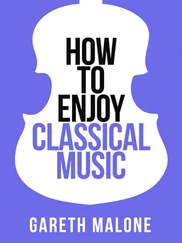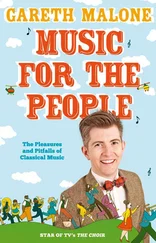STEPHEN FRY - OF CLASSICAL MUSIC
Здесь есть возможность читать онлайн «STEPHEN FRY - OF CLASSICAL MUSIC» весь текст электронной книги совершенно бесплатно (целиком полную версию без сокращений). В некоторых случаях можно слушать аудио, скачать через торрент в формате fb2 и присутствует краткое содержание. Жанр: на английском языке. Описание произведения, (предисловие) а так же отзывы посетителей доступны на портале библиотеки ЛибКат.
- Название:OF CLASSICAL MUSIC
- Автор:
- Жанр:
- Год:неизвестен
- ISBN:нет данных
- Рейтинг книги:5 / 5. Голосов: 1
-
Избранное:Добавить в избранное
- Отзывы:
-
Ваша оценка:
- 100
- 1
- 2
- 3
- 4
- 5
OF CLASSICAL MUSIC: краткое содержание, описание и аннотация
Предлагаем к чтению аннотацию, описание, краткое содержание или предисловие (зависит от того, что написал сам автор книги «OF CLASSICAL MUSIC»). Если вы не нашли необходимую информацию о книге — напишите в комментариях, мы постараемся отыскать её.
OF CLASSICAL MUSIC — читать онлайн бесплатно полную книгу (весь текст) целиком
Ниже представлен текст книги, разбитый по страницам. Система сохранения места последней прочитанной страницы, позволяет с удобством читать онлайн бесплатно книгу «OF CLASSICAL MUSIC», без необходимости каждый раз заново искать на чём Вы остановились. Поставьте закладку, и сможете в любой момент перейти на страницу, на которой закончили чтение.
Интервал:
Закладка:
Onward, now, to the Lennon and McCartney of the sixteenth century. Who were they? How did they manage to run the biggest musical monopoly since the last dodo learnt to whistle? Well, get your Renaissance head on, I'm going in. Cover me.
RENAISSANCE MAN
I
magine, if you will, it is 1572 - just over twenty years since Palestrina landed the top job in Rome. In Inghilterra, Elizabeth I has been on the throne for some thirteen years. In fact, speaking of the two in more or less the same breath, only a couple of years earlier, Pope Pius V had issued a jolly little excommunication 'bull', as they're called, which went by the cute little name of'Regnans in Excelsis'. It's quite a lengthy document, but if I might summarize it for you, it would be to say, 'We're not going to talk to you any more.' The Pope, that is, isn't going to talk to Elizabeth. Sad, really. I imagine Elizabeth would miss their little chats.
However, it was a good year for other forms of communication. In literature, we'd witnessed the births of John Donne and Ben Jonson, and in pigeonry - well, it was pretty high tech, back then - we had witnessed the first use of Nelson's favourite birds to send messages. It was from the Dutch town of Haarlem, which was under siege from the Spanish.
So: are you there yet? In the sixteenth century, I mean. Because it was against that background that things were really starting to bubble. In the Italy we've just left behind, the Gabrieli family were quite big noises now. Andrea Gabrieli, composer and organist at St Mark's Venice for the last six years, was busy adding all sorts of brass parts to his vocal music. More importantly, perhaps, was his nephew Giovanni, who took over from him at St Mark's, and who could be said to have preceded Dolby by some 400 years.
Giovanni Gabrieli was another organist/composer (I suppose you would say 'singer/songwriter' these days) who started to do the first experiments in stereo, effectively, writing music that had choirs and voices pitted against each other at either side of the huge St Mark's, making for some glorious antiphonal effects which must have really surprised his audience at the time. It must have been less like being at a concert and more like being at a tennis match. Stiff necks all round at St Mark's, maybe.
But back to good old England, and the Lennon and McCartney of the time. For it was in 1572 that the composer William Byrd was sent to work alongside fellow composer Thomas Tallis, forty years his senior and operating out of the Chapel Royal. Tallis had already been there some thirty years before the two joined forces, and, together, they became one of the biggest things in music since Pope Gregory first started to hum in the bathroom of a morning.
JOHN, PAUL, GEORGE, RINGO, WILL AND TOM
B
yrd was from Lincoln, Tallis possibly from Waltham Abbey. Apart, they were good musicians in their field - Tallis, particularly, respected as one of the grand old men of English music. But it was Queen Elizabeth who was to make their names still legendary today. She it was who, some three years after they joined forces, gave them the sole right to print music in England. Imagine it. Every note issued across the land belongs to them.
How could you fail? Their first venture was the 'Cantiones Sacrae' of 1575, a collection of motets^ written by the two composers themselves. Of course, I wouldn't want you to think that they took the opportunity of having cornered the market in the world of music printing to release only their own stuff. No, no, no! I mean, it's true, of course, but I just wouldn't want you to think it. The good thing was that at least it was in the hands of masters. I mean, the 'Cantiones Sacrae' was some of the most exquisite published music of 1575, albeit, to be fair, some of the ONLY published music of 1575.
What would happen now, then? I mean now that music was going to be printed on a regular basis? Well, despite the fact that it was still expensive and rare, it was, at least, getting out there. People with money could read it and get together and sing it, because, after all, it is fi A motet is a short church choral piece, or mini canal encircling a castle. still almost all vocal, remember. And here's where a lovely, serendipi-tously head-on collision of events and fashions comes together.
PRESS ON
P
rinting. We take it for granted now. We take it for granted that it's our inalienable right to arrive at work with thumbs covered in rubbed-off black ink, and eyes like Ching Ching the giant panda. But just imagine what it did to music! Music was suddenly… available.
It was 'in print'. Scores were available. Musicians and singers were available. And, against that backdrop, the next 'chance fashion' that came along would certainly find that the land was lying differently. Everything had changed. Everything was to play for. And what was the next big thing?
Greek and Roman style and culture was the NEXT BIG THING. And not just the styles, but the forms and features as well. So, some folk got into Greek drama again in a big way - the intellectuals, mainly. Only now, because this time around they had more than rocks and drums for accompaniment, the music became a much more important part. The writing had always been there. But the music? Well, the music relied, as it always did, on the technology of the day - the instruments, which had been somewhat primitive when the Greeks tried it first time around. The new versions of Greek dramas saw much more emphasis on the music - 'drammaper musica\ plays through music, as they were called, and they would become big hits. Where, first time round, you had dramas, this time round you had something completely different. In fact, it would only take someone, in the right place, at the right time to think… 'Hang on a minute…this could be big' and PING! You've got OPERA!
Who would be the first? Who would be the one to write the first ever opera? Who would be the one to go down in the annals of music history alongside the man in the iron mask, the man who broke the bank at Monte Carlo and the man from Delmontehesayyes. Who would be… The Man Who Invented Opera!' Well, whoever it was, was sure to become a household name. The first ever opera. Just think of it. You'd be famous the world over. You'd be feted for years to come. You could write your own cheques. People would name their children after you.
You'd be guaranteed an upgrade to business class, even if you weren't wearing a suit. You'd be remembered throughout all history. So how come it was…Jacopo Peri?
THE FIRST EVER OPERA (BUT ONE)
M
mm. I know what you're thinking. Who he? Ed? Quite, quite.
You see, the world has decided, somewhat dubiously, that the first opera ever written was Monteverdi's UOrfeo, which is only fair in so far as… well, in so far as it wasn't. Monteverdi's L'Orfeo was, in fact, the second opera ever written. Peri's Dafne was the first. So, where did it all go wrong for Peri? Because it's a bit like, well… imagine Neil Armstrong setting foot on the moon, the first man ever to do so, and yet the world decides to remember Buzz Aldrin as the hero. So, where did it all go wrong for Peri?
Well, it seems that giddy fortune's furious fickle wheel is really the culprit, here. True, Monteverdi, it seems, was probably by far the more skilful of the two composers, with an oeuvre richer in harmonic invention and melody. Peri was more or less his contemporary, born in Rome and one of the great musicians of his day, as well as friend of the Medicis. He was also one of the in-crowd, as it were, and, as such, probably there at the sharp end when dmmma per musica came back in. Indeed, he almost certainly had a hand in reviving it, alongside some of his fellow writers. Where fortune seems to have favoured Monteverdi, though, is in the simple but crucial matter of survival. The score of Monteverdi's UOrfeo survived; the score of Peri's Dafne didn't. To add further insult to injury, Peri's second opera, Eurydice, was written some seven years before the first performance of Monteverdi's UOrfeo, and is, technically speaking - with full surviving score, etc - the first opera in existence. And yet, despite all that, the ground-breaking nature of Monteverdi's opera still leads many to describe it today as the first 'real' opera ever written. I don't know, what is a man to do? It reminds me of the story of Edison and his telephone and the dodgy dealings which led to the failure of rival designs. Still. What's done is done: Monteverdi is remembered some 450 years after his birth, while Peri is no more than a piece of trivia in the classical music section of a pub quiz. Isn't life a bastard?
Читать дальшеИнтервал:
Закладка:
Похожие книги на «OF CLASSICAL MUSIC»
Представляем Вашему вниманию похожие книги на «OF CLASSICAL MUSIC» списком для выбора. Мы отобрали схожую по названию и смыслу литературу в надежде предоставить читателям больше вариантов отыскать новые, интересные, ещё непрочитанные произведения.
Обсуждение, отзывы о книге «OF CLASSICAL MUSIC» и просто собственные мнения читателей. Оставьте ваши комментарии, напишите, что Вы думаете о произведении, его смысле или главных героях. Укажите что конкретно понравилось, а что нет, и почему Вы так считаете.










